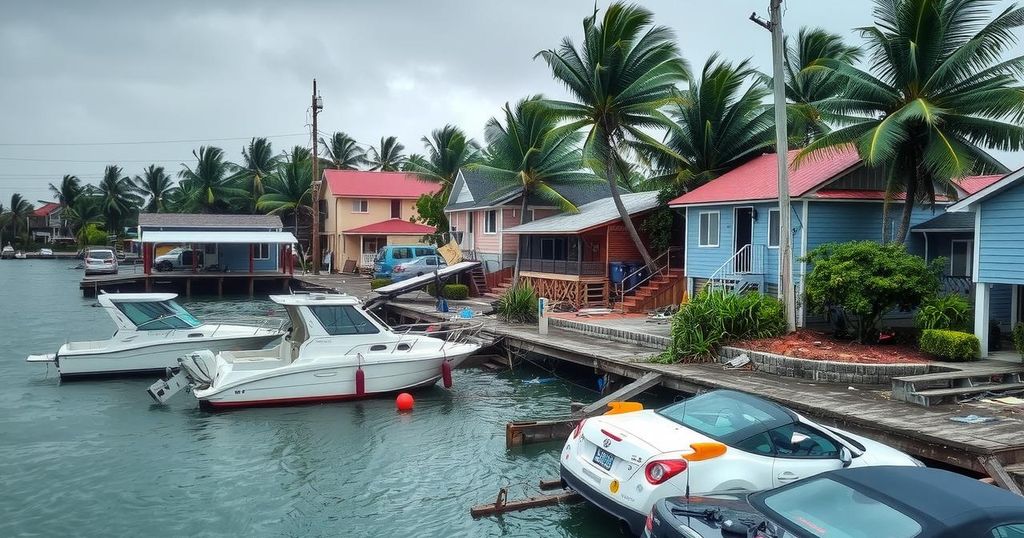Tropical Storm Dikeledi has struck Mayotte, compounding the devastation from Cyclone Chido just a month prior. With the storm prompting a red alert, residents are urged to prepare for further challenges as they grapple with recovery efforts from last month’s catastrophe. The article highlights infrastructure weaknesses and socio-economic issues in Mayotte, emphasizing the need for improved disaster preparedness and international support for the region.
Mayotte, a French territory located in the Indian Ocean, is currently facing another natural disaster as Tropical Storm Dikeledi makes landfall, prompting a red alert across the archipelago. This comes shortly after the region began its arduous recovery from Cyclone Chido, a catastrophic event that occurred in December 2024, resulting in at least 39 fatalities and leaving thousands injured. Affected residents are once again advised to stay indoors as heavy rainfall and strong winds threaten to exacerbate ongoing recovery efforts.
The challenges that Mayotte faces are particularly poignant given its status as one of France’s poorest departments. The territory’s infrastructure has proven inadequate in the face of repeated tropical storms, demonstrating the urgent need for improved disaster preparedness and response measures. Following Cyclone Chido, which was described as possibly the worst storm in nearly a century, the island has struggled with power outages, destruction of property, and the search for nearly 200 missing individuals. Dikeledi’s arrival brings new threats of flash flooding and winds that could hinder already delicate rebuilding activities.
In response to Dikeledi, local authorities in Mayotte have called for emergency measures, advising residents to stockpile essential supplies and take shelter in solid structures. Emergency services and aid organizations are mobilizing to deliver urgent assistance to affected populations. However, the logistics inherent to Mayotte’s geographical isolation complicate relief efforts, requiring significant coordination and planning to address the region’s urgent needs effectively.
Furthermore, the frequency of these storms raises pressing concerns about the impact of climate change on vulnerable island territories. The increasing severity and number of tropical systems in the Indian Ocean correlate with rising sea temperatures, emphasizing an urgent need for a comprehensive disaster management strategy tailored to Mayotte’s unique challenges.
Alongside the immediate threats presented by these natural disasters, Mayotte grapples with enduring socio-economic difficulties, including high unemployment rates, limited healthcare access, and substandard housing conditions. These systemic issues exacerbate the impact of natural catastrophes, creating a cycle of vulnerability that must be addressed in the recovery process.
As Mayotte begins to assess the damages from Dikeledi, it is crucial that recovery efforts pivot towards both urgent relief and long-term resilience. Effective collaboration amongst local authorities, international partners, and the community is essential for a sustainable recovery framework that also positions the region to cope with the challenges of future storms.
This situation underscores the international community’s obligation to bolster support for vulnerable regions experiencing the disproportionate adversities of climate change. By enhancing global cooperation and resource allocation for climate resilience initiatives, it is possible to foster not only the recovery of Mayotte but also serve as a model for other susceptible areas worldwide.
The article discusses the plight of the French territory of Mayotte following the impact of Tropical Storm Dikeledi, which arrives as the region struggles to recover from Cyclone Chido, a storm that inflicted significant damage and loss of life just a month earlier. The context highlights Mayotte’s vulnerability to severe weather events and the socio-economic challenges that magnify the consequences of such disasters, emphasizing the need for improved preparedness and international support for recovery efforts.
In conclusion, the concurrent challenges posed by Cyclone Chido and Tropical Storm Dikeledi highlight the urgent need for enhanced disaster response strategies in Mayotte. As the region navigates through immediate needs for aid and long-term recovery, it will require a concerted effort from local, national, and international entities to build resilience against future natural disasters. The international community’s role is pivotal in providing necessary resources and expertise to ensure Mayotte’s sustainable recovery and strengthen its capacity to withstand the effects of climate change.
Original Source: www.travelandtourworld.com






